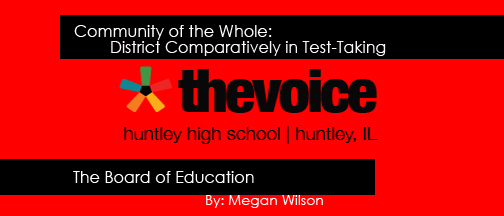By Megan Wilson
The Board of Education had their monthly, Community of the Whole meeting on Oct. 11 discussing various topics ranging from test scores to dealing with building repairs and regulations.
Roll call took place, and school board president and McHenry County Board running candidate, Michael Skala was absent from this meeting.
The first main topic of the evening’s meeting was an overview of the advanced placement program offered at Huntley High School.
Faculty members present were Stephen Styers, AP Statistics, AP Economics, and AP BC Calculus teacher, Shelly Kish, mathematics department head, AP coordinator, Angie Daurer, and team leader of counseling department, Pat Olson-McGee.
Styers clarified for the board that advance placement classes are college courses that are provided at a high school level. He offered some statistics data for the growing interest in AP courses.
In the 2006 school year, 57 students took 96 exams while in 2012, 516 students took 842 exams in about 18 subjects. Compared to the six students who took eight exams in 1991 when AP courses were first starting. One student out of every 25 were taking an AP course in 2006, but now one out of every four or five students are taking a college level course in 2012. There is a 40 percent participation growth since 2012, and even two out of every five students took and passed at least one AP exam.
Styers then took the time to publically praise AP teachers, Julie and Todd Swartzloff. Julie has been teaching AP Spanish and has been doing well comparatively on a global level while Todd took on teaching AP United States History last summer. His test scores were up 50 percent and beat the national average, four out of every five students passing the AP Exam.
“From the ground up, we say if you are good at something [and] are willing to work; we will find a way to help you,” said Olson-McGee. “And we don’t just do it with AP classes. We do it in art. We do it in technology. We do it with the newspaper, and we do it in all areas.
Kish then confronted the board about another concern. In the high Cohort program that was created several years ago, those students are maxing out on their math courses way before they even graduate. Most of these students are underclassman taking senior level courses like AP Calculus BC and AB as well as AP Statistics. AP Multivariable Calculus will be added next year as a semester long course and Linear Algebra will be the second semester of that course according to Kish.
“[These] are classes that by the way I never even took until I was a sophomore in college majoring in Math,” said Kish. “Now juniors and seniors will be taking these classes in high school.”
Although in some areas students are not doing as up to standards as teachers wish they were at. Tony Quagliano then asked Styers advice on what can be done to refine those subjects so they can be better.
“We need to look at the whole picture…,” said Styers. “We do not just need to look at the course, we need to look at the whole program leading up to that… If I did not have the kind of quality teachers providing Algebra II, Pre-Calculus Honors, demanding that kind of rigor then I would not be able to get the results that I could… And see what we can do to make sure success occurs.”
In some schools, teachers do not require their students to take the AP exam in May according to Styers whether or not it is a blended learning class or not. It is up to the student whether or not he or she wants to take the test.
“We want to hold ourselves accountable…,” said Styers. “We are not willing to cherry pick. We are going to demand that everybody takes that test. We want to see how [blended] measures up data wise… They hold themselves accountable every day. We have to do the same here.”
“The biggest thing we can do as a school district is to prove that we have a culture of high expectations…” said superintendent, Doctor John Burkey. “We also understand what [AP] is doing for our students and it is very worthwhile.”
Community member Alan Scott had then confronted the board about the annual Student Achievement tests. According to tests results that he has viewed, third grade math and science has had a slight decline on the amount of time that is spent teaching in the classroom compared to English. He advised the Board to look into a better education in the math and science learning department.
Scott then went on to point out in last year’s Prairie State Achievement Exam, the Asian demographic exceeded for more than the other demographic categories.
“You need to find what they are doing,” said Scott. “And you need to find what their parents are doing to make them jump out like that.”

